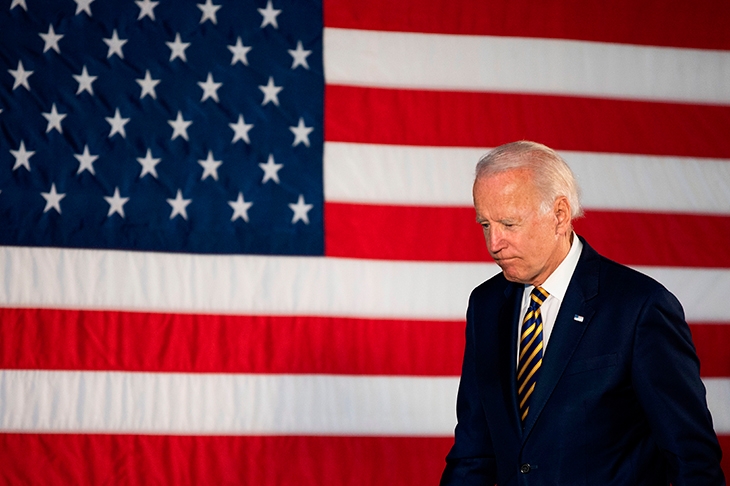At the best of times, US presidential elections require the British government to walk a tightrope. In 1992, a Tory prime minister got this very wrong. John Major’s excessive support for George Bush Sr’s unsuccessful re-election effort alienated Bill Clinton. The damage to the UK’s relationship with the country’s most important security partner was only fully repaired when Tony Blair became prime minister in 1997.
This time around, things are particularly tricky for the UK, since Donald Trump doesn’t feel bound by normal diplomatic protocols — just look at his interventions in UK politics since taking office — and isn’t shy about asking for favors from foreign leaders (see the accusations from his former national security adviser, John Bolton).
Boris Johnson is a canny enough politician not to make Major’s mistake, especially given the polls suggest Joe Biden is the clear favorite to win in November. Despite Johnson’s closeness to the President and his son-in-law, Jared Kushner, he will avoid anything that looks like an endorsement of Trump.
If Biden wins the White House there would be challenges for the UK government. Those around him are, to put it mildly, not fans of Brexit: they believe it to be bad for the US, the EU and the UK. They are particularly concerned about its effect on the Irish border. Washington is clear that any British backsliding on that protocol would cause problems, not just with a Biden White House, but on Capitol Hill, too. A Biden administration would also be particularly keen to build bridges with the EU after Trump’s hostility to it. This could leave the UK rather sidelined.
But a Biden presidency could be easier for the UK than a second Trump term. If the democratic world is in an ideological contest with China, then it needs to compete in every arena — not just walk away, as Trump has with the World Health Organization.
A Biden administration would also be more in line with Johnson on Russia. Having tried — and failed — to reset relations with Moscow as foreign secretary, Johnson is now a Russia hawk. Those close to him say the Salisbury poisonings, which happened when he was at the Foreign Office, have hugely influenced his world view. It is notable that the UK rapidly — and publicly — broke with Trump when he recently suggested Russia should be readmitted to the G7.
In a further sign of how worried Johnson is by Russia, one of his arguments for bringing the Department for International Development into the Foreign Office was to ensure that more resources are directed to the western Balkans and Ukraine to counter Russian meddling there. With Trump in the White House, the US is an unreliable ally when it comes to dealing with Russia. Trump’s desire to make some grand bargain with Putin will always have the potential to undercut any effort to support countries in Moscow’s ‘near-abroad’. The UK would find it easier to work with Biden on this front.
Trump’s attitude to autocrats in general is worrying. He makes little distinction between those who are democratically elected and those who aren’t. A Biden foreign policy would be based far more on the idea of cooperation between like-minded democracies. Indeed, it is noticeable that Downing Street’s idea for a new club of democracies, a D10 — the G7 plus Australia, India and South Korea — has drawn praise from several in Biden’s circle. On this, I am told that the Brits are ‘pushing at an open door’.
After the government’s recent shift on China, the UK is already being taken more seriously in Washington. Johnson’s decision in January to allow Huawei a permanent role in the UK’s 5G network caused consternation among both Democrats and Republicans. The coming reversal of that decision will help restore some of the UK’s credibility. It will also mean that the UK can hope to be part of any US-led effort to counter China’s advantages in technologies such as 5G, which will come whoever wins in November. (In a sign of the sensitivity of this issue, Mike Pompeo, the Secretary of State, has lobbied key Tories for South Cambridgeshire district council not to grant Huawei planning permission for a research lab there.)
In the aftermath of Trump’s 2016 victory, many Brexiteers hoped that a UK/US trade deal would soon follow. Trump certainly turned Barack Obama’s ‘back of the queue’ rhetoric on its head, but as his trade representative recently said, a deal won’t be done before the presidential election. Any trade deal with Trump’s America will also be so favorable to American agricultural interests — which are concentrated in pro-Trump states — that it will be a particularly difficult political sell in the UK.
[special_offer]
There had been some hope in Tory circles that Biden, should he become president, would take the US into the Trans-Pacific Partnership, using the argument that it was necessary to counter Chinese influence. In this scenario the UK could then have joined this trade agreement, turning it into a sort of economic Nato, and sidestepping the chlorinated chicken-style objections to a trade deal with the US. But the view in Washington is that Biden won’t do this.
There would, though, be some changes made on trade during a Biden first term which could well benefit the UK. The view of one Tory with better links to the Biden camp than most is that the UK’s efforts to get ready for a potential change of administration are ‘not enough’. Johnson’s decision to skip the Munich Security Conference in February (James Cleverly was the most senior minister to attend) meant that a valuable opportunity to influence those around the former vice-president was missed.
Trump has always been pro-Brexit in his rhetoric. He has broken decisively with US foreign policy orthodoxy, which has long assumed that more European integration is inherently a good thing. But his words of support have delivered little in terms of practical assistance for Brexit Britain. He has also been a difficult ally, alienating other democracies, undercutting America’s moral leadership in the world and generating considerable uncertainty. Biden would be a less enthusiastic ally of Brexit Britain, but he might be a more useful one. He is better suited than Trump to leading an effort by the democratic world to counter China. He also wouldn’t inflame UK public opinion in the way that Trump does. In short, he would make it easier for Johnson to be pro-American at home and abroad, and that is ultimately in Britain’s national interest.
This article was originally published in The Spectator’s UK magazine. Subscribe to the US edition here.


















